
Herbert Word is surrounded by history — history of the generations of family that preceded him as farmers on the picturesque rolling hills and bottom land he and his son, Herbert III (Trey), now farm in Monroe County, Miss., near Okolona. They now represent the fifth and sixth generations of their family who have farmed here.
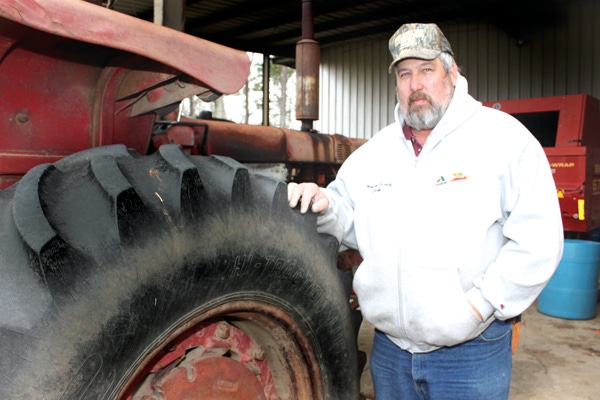
Herbert Word is surrounded by history — history of the generations of family that preceded him as farmers on the picturesque rolling hills and bottom land he and his son, Herbert III (Trey), now farm in Monroe County, Miss., near Okolona.
With a raw north wind whipping through aged, fern-encrusted oak trees that frame a bottomland vista where cows graze in the distance, he points to the “home place” where his grandparents’ house once stood and where he grew up.
Back up the road a ways is the Word family cemetery, monuments stark against leaden not-quite-spring skies. Over yonder is where his father was among the first in the area with poultry houses, integrated hog parlors, and later a custom feed operation, complete with a snazzy mobile mixer truck. And in almost every direction are the homes and land of family members and relatives.
Everywhere in the landscape — in his shop building, in his storage sheds, and dotting the surrounding field and woods — is the accumulation of his own life in farming (and an admitted addiction to auctions): early era vehicles and a multitude of farm equipment from decades past, tools of every imaginable kind, spare parts galore, bins of nuts and bolts rivaling a hardware store, belts and hoses dangling from the ceiling, and on a table in the midst of it all, an incubator holding a couple dozen eggs from his free range hens that he’s hatching.
“I’m something of a hoarder,” he laughs. “When I moved on this hilltop years ago, there was nothing here but two old vehicles, and now, after 35 years of buying and trading, just look at all the stuff. Many times, I’ve asked myself, ‘Why did I do that?’ But, I just never get rid of anything — you never know when you may need it. I bought a combine identical to the one I use just so I could have it for parts.”
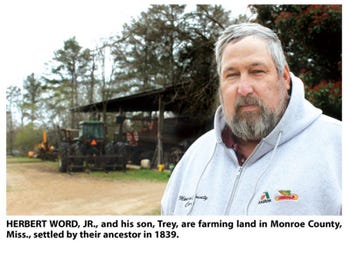 His “Old Country” ancestor, John Word, came to the U.S. from Wales in the 1600s, and his great-great grandfather, Samuel Word, settled here in Monroe County in 1839, coming from Virginia, with stop-offs in the Carolinas and north Alabama. His great-grandfather, William Word, fought as a captain in the Civil War, was shot in the head, lost pieces of his skull and parts of his brain — but miraculously survived the primitive surgery to extract the musket ball from inside his head, and lived into his 90s.
His “Old Country” ancestor, John Word, came to the U.S. from Wales in the 1600s, and his great-great grandfather, Samuel Word, settled here in Monroe County in 1839, coming from Virginia, with stop-offs in the Carolinas and north Alabama. His great-grandfather, William Word, fought as a captain in the Civil War, was shot in the head, lost pieces of his skull and parts of his brain — but miraculously survived the primitive surgery to extract the musket ball from inside his head, and lived into his 90s.
“My grandfather, Thomas Lawler Word, had beef cattle, but also raised hogs and milk cows, and grew everything that was needed for food for his family. He raised chickens and turkeys to sell — he’d haul live turkeys to Memphis and Birmingham for the holidays. He helped my father and uncle get started in dairying, beef cattle, and row cropping. He was also the one who named this place, Oakland Stock Farms, and we’ve kept the name.
“My uncle looked after the dairy and row crops and my father was one of the pioneers of poultry houses in this area and later had an integrated hog parlor operation. But he suffered from asthma, which was aggravated by the dust and dirt of farming, and he worked for years as the vocational rehabilitation director for Monroe County.
“Both my father and uncle went to Mississippi State University and later, when I began farming, I could look back and see how they had used the knowledge they acquired in school to make their farming operations more efficient.”
Football scholarship at Mississippi State
Herbert also went to Mississippi State on a football scholarship and got a degree in education, with a minor in science.
“I was thinking in terms of an agribusiness career, but figured if it came to it I could teach and coach. I always knew, though, deep down, what I wanted to do, where I wanted to be: I wanted to farm, to be right here on this land. Even while I was in school, I’d drive back to the farm every week to help out.
“When I got my degree, there were no teaching/coaching positions in this area, and the top salary for those jobs was only $6,500 a year, so I quickly decided that wasn’t for me.
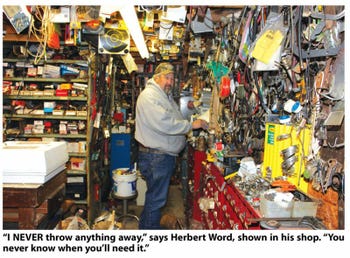 “By that time, my uncle was sick and later died, and my father had only beef cows. I drove gravel trucks and did other jobs to earn money, and after my uncle died, I farmed his land for a year, then was able to buy it. I later bought out my father and bought the home place that was my grandfather’s. I’ve been farming on my own since 1976.”
“By that time, my uncle was sick and later died, and my father had only beef cows. I drove gravel trucks and did other jobs to earn money, and after my uncle died, I farmed his land for a year, then was able to buy it. I later bought out my father and bought the home place that was my grandfather’s. I’ve been farming on my own since 1976.”
That was about the time, he says, that Delta farmers were transitioning from four-row to six-row equipment, and farmers here in the hills could go there and buy used equipment at reasonable prices.
“Sledge Taylor, now a farmer/ginner at Como, Miss., and I share a common Word ancestor ‘way back. When his father, Bill, was changing out his equipment, I went over and bought just about everything I needed from him — cultivator, planter, do-all. I also bought an International 806 tractor at Planters Equipment Co. at Belzoni. They laughed and told me it was all worn out. I’m still using it today to haul hay.
“I got a chisel plow and disk at an auction. Somewhere along the way, I got hooked on auctions. Since 1980 I’ve been a licensed professional auctioneer, and I do quite a bit of that work during the winter months.”
“Farming in the ‘70s was good and I expanded. In the ‘80s and ‘90s, I was farming a lot of acres, but then I started losing rented land because landlords decided to put their land in the Conservation Reserve Program, or they died and their heirs didn’t want to continue renting the land for cropping.
“At one time, I had more than 30 landlords to deal with and farms scattered for seven miles up and down the road from here. The logistics of it and the management just got to the point that we were faced with getting bigger, borrowing a lot of money, and hiring labor, or downsizing to what the two of us could handle ourselves.
“We decided we didn’t want to take on a lot of debt and a lot of headaches, so we converted all but 10 acres of our owned land to pasture and hay, and kept soybeans on the rented land.”
For 15 years, Word says, they’ve had no hired labor. “We do it all ourselves. We buy only used equipment, and 80 percent of the maintenance and repair work we do ourselves. If there’s something we can’t handle, we’ll swap out work with family and friends. And (he laughs) I’ve got all those spare parts lying around everywhere.”
Over the years, for their cow-calf operation, he says they have bought two Hereford herds from farmers exiting the business and bought his grandfather’s Angus herd.
“Then we started mixing in Brangus and Simmentals and now Trey and I have a mix of breeds. We save our own heifers. I’ve never bought a cow at auction; we’ve either raised our own, or bought out other herds.
Sells calves at 400 to 500 lbs.
“We run about 200 mama cows, and we try to sell the calves at 450 to 500 lbs. As high-priced as grain is now, we don’t want to feed them any longer than we have to. We sell mostly through local area sale barns.
“We try to get as many calves as we can out of our cows. Unlike most people who get rid of older cows, we keep them on, and they will often produce additional calves. We have six bulls: four Angus, a Charolais, and a Charolais/Angus mix. Beef prices are very good now, and we’re making up for some of the not-so-good years.”
For hay, they grow johnsongrass — “I know that sounds crazy to row crop farmers who hate the stuff,” he says — and some bermudagrass and dallasgrass. They usually put up over 600 rolls of hay for the winter, and some years plant ryegrass and wheat in the bottoms for winter pasture.
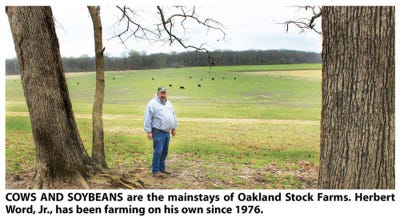 In years past, Word says, they have used mineral tubs and blocks for supplements and worming medications, but this past winter, in two pastures, they’ve been trying Purina Sup-R-Lix, a molasses-based protein supplement that provides a balance of all essential nutrients — energy, protein, vitamins, and minerals
In years past, Word says, they have used mineral tubs and blocks for supplements and worming medications, but this past winter, in two pastures, they’ve been trying Purina Sup-R-Lix, a molasses-based protein supplement that provides a balance of all essential nutrients — energy, protein, vitamins, and minerals
“This has been a particularly severe winter from a feeding standpoint, he says. “We had to start feeding earlier than normal. But, I believe feed utilization has been better in the pastures where the cows had the Purina Sup-R-Lix, and I probably will use it in all the pastures next winter.”
Despite the adverse weather, he says “we only lost three cows this winter; last winter we lost 22 grown cows, and a loss like that hurts.
“We haven’t had any problem with coyotes or roaming dogs; our biggest problem is with buzzards, which will attack just-born calves and mother cows that are weakened from giving birth. I’ve seen as many as 50 or 60 at a time attacking a calf or cow.”
Their soybeans last year were Asgrow 5605 Roundup Ready.
“We plant Group Vs, because we just can’t get into our bottomland fields until May. The Roundup Ready system works well, but we’ve had a problem with teaweed, so we apply Valor behind the planter and it does a good job of control. This year we’ll probably use some Dual or Prowl at planting, too, to hold the grasses until we can get in and apply postemerge Roundup.
“We’re usually the last ones to get planted and the last ones to finish harvesting. We’ll start out cutting 40 bushel beans, but that starts dropping as the weather gets bad and brings our yield average down. Last year, we had problems getting the beans to dry down for harvest, and we ended up having to cut every field twice. In 2009, when it rained so much, we harvested just enough that the crop insurance wouldn’t pay.”
They take their beans to Tom Sawyer Grain near West Point, Miss., about 20 miles away. Most of their farms are share-rent, Word says, and it just isn’t financially feasible to build on-farm storage.
Area farming changing
The face of farming in the area continues to change, he says.
“In the ‘70s, all the land around here was in crops or pastures, but over the years a lot has gone into CRP, and more and more people are building houses. The hills have gone back to pastures or hay, and the row crops that are left are in the bottomlands.
“When I was a kid, there were 60 or 70 dairies in this county, and there were five Grade A dairies and five Grade C dairies in this immediate area; now there is one lone dairy in the entire county. From the 1970s to the 1990s, there were seven or eight different people who farmed and lived in this immediate area; now Trey and I are the only farmers who live here.”
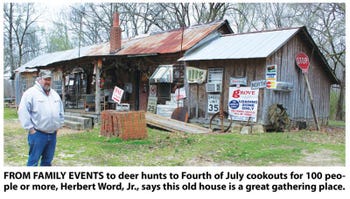 In addition to his farming and other interests, Word is president of Monroe County Farm Bureau and active in the Mississippi Farm Bureau Federation, just recently having participated in a legislative trip to Washington. He is treasurer of Wren Presbyterian Church and sings in the choir, and is president of Wren Volunteer Fire Department.
In addition to his farming and other interests, Word is president of Monroe County Farm Bureau and active in the Mississippi Farm Bureau Federation, just recently having participated in a legislative trip to Washington. He is treasurer of Wren Presbyterian Church and sings in the choir, and is president of Wren Volunteer Fire Department.
A favorite ongoing project is an old house, decorated with all manner of signs outside and mounted deer and elk heads and bric-a-brac of the years inside, that is used for family reunions and gatherings throughout the year. He has a brick pit outside, on which he can roast a whole hog, and inside there’s a commercial range for large scale cooking.
“We’ll have 100 to 150 people show up for our Fourth of July barbecue,” he says.
“I’ve always enjoyed cooking and grilling, and I spent quite a bit of time a few years ago as grill master for 2Brothers BBQ Sauce, which was founded by two members of the Bryan meat packing family at nearby West Point, Miss.
“We did grilling demos all over and on the NASCAR circuit. That led to my working with celebrity TV chef Mario Batali on a NASCAR cookbook, Mario Tailgates NASCAR Style — there’s a full page color photo of me in the book.
“But that took a lot of time away from the farm, with Trey taking up the slack, so I eased out of that and came back to farming.”
His wife, Joanie, who recently retired from after a 28-year teaching career, “has been my helpmate,” he says, “and I couldn’t have made it without her all these years, or without all the time and work that Trey now puts into the operation, in addition to his off-farm jobs.”
In working auctions for a lot of farmers who were selling out, Word says, “I had the opportunity to pick the brains of a lot of FHA people and bankers, and that has worked to my advantage in dealing with them over the years. I hung in there and finally got out from under FHA, and for the last 10 years I haven’t borrowed a dime of operating money.
“One of the lessons that was drilled into us in Mississippi State football was that to win, you give it all you’ve got, you stick with it, and you don’t quit. And that has pretty much worked for me in farming.
“Long after I’m gone, I hope my grandchildren and great-grandchildren will still be on this land.”
About the Author(s)
You May Also Like



